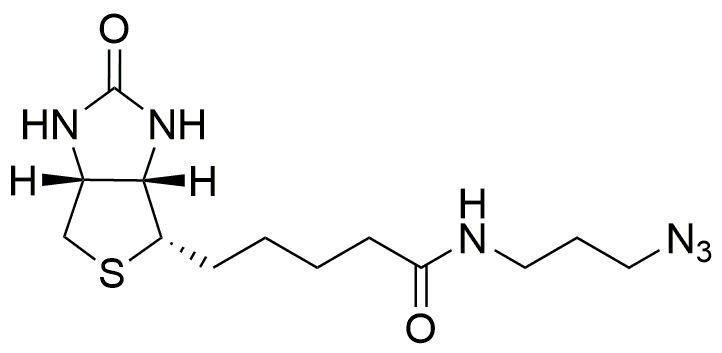N-(3-Azidopropyl)biotinamide is widely utilized in research focused on:
- Bioconjugation: This compound is frequently used to attach biomolecules to surfaces or other molecules, enhancing the study of protein interactions and cellular processes.
- Drug Delivery Systems: Its azide group allows for click chemistry applications, making it a valuable component in developing targeted drug delivery systems that improve therapeutic efficacy.
- Diagnostics: The compound plays a crucial role in the development of diagnostic tools, particularly in assays that require biotin-streptavidin interactions, which are essential for detecting specific biomolecules.
- Protein Labeling: Researchers use this chemical for labeling proteins with biotin, facilitating the purification and detection of proteins in various biological assays.
- Gene Editing: It can be employed in gene editing technologies, where biotinylated oligonucleotides are used to enhance the specificity and efficiency of CRISPR systems.
General Information
Properties
Safety and Regulations
Applications
N-(3-Azidopropyl)biotinamide is widely utilized in research focused on:
- Bioconjugation: This compound is frequently used to attach biomolecules to surfaces or other molecules, enhancing the study of protein interactions and cellular processes.
- Drug Delivery Systems: Its azide group allows for click chemistry applications, making it a valuable component in developing targeted drug delivery systems that improve therapeutic efficacy.
- Diagnostics: The compound plays a crucial role in the development of diagnostic tools, particularly in assays that require biotin-streptavidin interactions, which are essential for detecting specific biomolecules.
- Protein Labeling: Researchers use this chemical for labeling proteins with biotin, facilitating the purification and detection of proteins in various biological assays.
- Gene Editing: It can be employed in gene editing technologies, where biotinylated oligonucleotides are used to enhance the specificity and efficiency of CRISPR systems.
Documents
Safety Data Sheets (SDS)
The SDS provides comprehensive safety information on handling, storage, and disposal of the product.
Product Specification (PS)
The PS provides a comprehensive breakdown of the product’s properties, including chemical composition, physical state, purity, and storage requirements. It also details acceptable quality ranges and the product's intended applications.
Certificates of Analysis (COA)
Search for Certificates of Analysis (COA) by entering the products Lot Number. Lot and Batch Numbers can be found on a product’s label following the words ‘Lot’ or ‘Batch’.
Numéro de catalogue
Numéro de lot/série
Certificates Of Origin (COO)
This COO confirms the country where the product was manufactured, and also details the materials and components used in it and whether it is derived from natural, synthetic, or other specific sources. This certificate may be required for customs, trade, and regulatory compliance.
Numéro de catalogue
Numéro de lot/série
Safety Data Sheets (SDS)
The SDS provides comprehensive safety information on handling, storage, and disposal of the product.
DownloadProduct Specification (PS)
The PS provides a comprehensive breakdown of the product’s properties, including chemical composition, physical state, purity, and storage requirements. It also details acceptable quality ranges and the product's intended applications.
DownloadCertificates of Analysis (COA)
Search for Certificates of Analysis (COA) by entering the products Lot Number. Lot and Batch Numbers can be found on a product’s label following the words ‘Lot’ or ‘Batch’.
Numéro de catalogue
Numéro de lot/série
Certificates Of Origin (COO)
This COO confirms the country where the product was manufactured, and also details the materials and components used in it and whether it is derived from natural, synthetic, or other specific sources. This certificate may be required for customs, trade, and regulatory compliance.


